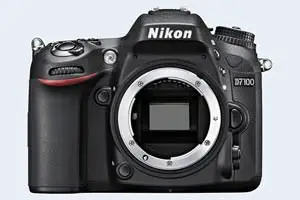Leica V-LUX 4 vs Nikon D7100
The Leica V-LUX 4 and the Nikon D7100 are two digital cameras that were officially introduced, respectively, in September 2012 and February 2013. The V-LUX 4 is a fixed lens compact, while the D7100 is a DSLR. The cameras are based on a 1/2.3-inch (V-LUX 4) and an APS-C (D7100) sensor. The Leica has a resolution of 12 megapixels, whereas the Nikon provides 24 MP.
Below is an overview of the main specs of the two cameras as a starting point for the comparison.

Check V-LUX 4 offers at
ebay.com

Check D7100 offers at
ebay.com
Going beyond this snapshot of core features and characteristics, what are the differences between the Leica V-LUX 4 and the Nikon D7100? Which one should you buy? Read on to find out how these two cameras compare with respect to their body size, their imaging sensors, their shooting features, their input-output connections, and their reception by expert reviewers.
Body comparison
The physical size and weight of the Leica V-LUX 4 and the Nikon D7100 are illustrated in the side-by-side display below. The two cameras are presented according to their relative size. Three successive views from the front, the top, and the rear are shown. All width, height and depth dimensions are rounded to the nearest millimeter.
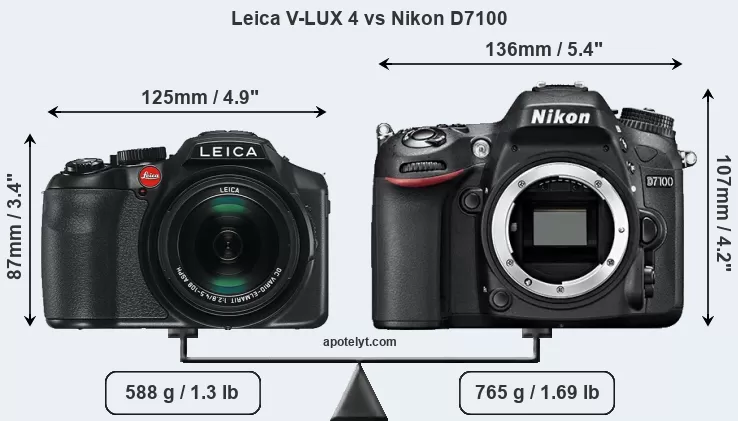
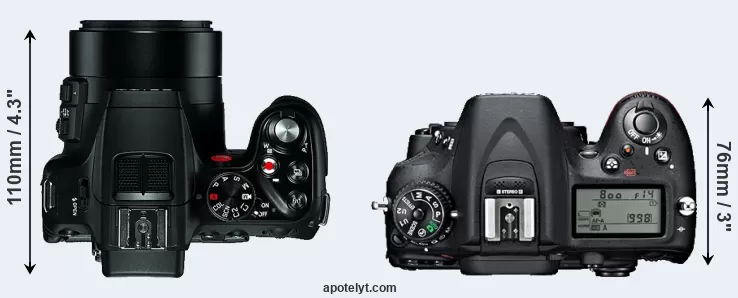
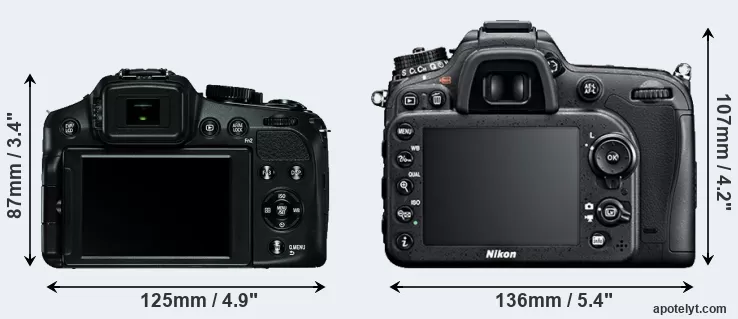
If the front view area (width x height) of the cameras is taken as an aggregate measure of their size, the Nikon D7100 is notably larger (34 percent) than the Leica V-LUX 4. It is noteworthy in this context that the D7100 is splash and dust-proof, while the V-LUX 4 does not feature any corresponding weather-sealing.
The above size and weight comparisons are to some extent incomplete and possibly misleading, as the V-LUX 4 has a lens built in, whereas the D7100 is an interchangeable lens camera that requires a separate lens. Attaching the latter will add extra weight and bulk to the setup. You can compare the optics available for the D7100 and their specifications in the Nikon Lens Catalog.
Concerning battery life, the V-LUX 4 gets 540 shots out of its Leica BP-DC12 battery, while the D7100 can take 950 images on a single charge of its Nikon EN-EL15 power pack.
The following table provides a synthesis of the main physical specifications of the two cameras and other similar ones. If you would like to visualize and compare a different camera combination, you can navigate to the CAM-parator app and make your selection from a broad list of cameras there.

| Camera Model |
Camera Width |
Camera Height |
Camera Depth |
Camera Weight |
Battery Life |
Weather Sealing |
Camera Launch |
Launch Price (USD) |
Street Price |
||
|---|---|---|---|---|---|---|---|---|---|---|---|
| 1. | Leica V-LUX 4 | 125 mm | 87 mm | 110 mm | 588 g | 540 | n | Sep 2012 | 949 | ebay.com | |
| 2. | Nikon D7100 | 136 mm | 107 mm | 76 mm | 765 g | 950 | Y | Feb 2013 | 1,199 | ebay.com | |
| 3. | Canon 70D | 139 mm | 104 mm | 79 mm | 755 g | 920 | Y | Jul 2013 | 1,199 | ebay.com | |
| 4. | Canon G1 X | 117 mm | 81 mm | 65 mm | 534 g | 250 | n | Jan 2012 | 799 | ebay.com | |
| 5. | Canon G1 X Mark II | 116 mm | 74 mm | 66 mm | 553 g | 240 | n | Feb 2014 | 799 | ebay.com | |
| 6. | Canon SX40 | 123 mm | 92 mm | 108 mm | 600 g | 380 | n | Sep 2011 | 429 | ebay.com | |
| 7. | Canon SX50 | 123 mm | 87 mm | 106 mm | 595 g | 315 | n | Sep 2012 | 429 | ebay.com | |
| 8. | Leica D-LUX 6 | 111 mm | 68 mm | 46 mm | 298 g | 330 | n | Sep 2012 | 699 | ebay.com | |
| 9. | Leica V-LUX 2 | 124 mm | 80 mm | 95 mm | 520 g | 410 | n | Sep 2010 | 849 | ebay.com | |
| 10. | Leica V-LUX 3 | 124 mm | 81 mm | 95 mm | 540 g | 410 | n | Dec 2011 | 949 | ebay.com | |
| 11. | Leica X Vario | 133 mm | 73 mm | 95 mm | 680 g | 450 | n | Jun 2013 | 2,850 | ebay.com | |
| 12. | Nikon D3300 | 124 mm | 98 mm | 76 mm | 430 g | 700 | n | Jan 2014 | 499 | ebay.com | |
| 13. | Nikon D7000 | 132 mm | 105 mm | 77 mm | 780 g | 1050 | Y | Sep 2010 | 1,499 | ebay.com | |
| 14. | Nikon D7200 | 136 mm | 107 mm | 76 mm | 765 g | 1110 | Y | Mar 2015 | 1,199 | ebay.com | |
| 15. | Nikon D7500 | 136 mm | 104 mm | 73 mm | 720 g | 950 | Y | Apr 2017 | 1,299 | amazon.com | |
| 16. | Panasonic FZ150 | 124 mm | 82 mm | 92 mm | 528 g | 410 | n | Aug 2011 | 499 | ebay.com | |
| 17. | Panasonic FZ200 | 125 mm | 87 mm | 110 mm | 588 g | 540 | n | Jul 2012 | 599 | ebay.com | |
| Note: Measurements and pricing do not include easily detachable parts, such as add-on or interchangeable lenses or optional viewfinders. | |||||||||||
Any camera decision will obviously take relative prices into account. The listed launch prices provide an indication of the market segment that the manufacturer of the cameras have been targeting. The V-LUX 4 was launched at a lower price than the D7100, despite having a lens built in. Usually, retail prices stay at first close to the launch price, but after several months, discounts become available. Later in the product cycle and, in particular, when the replacement model is about to appear, further discounting and stock clearance sales often push the camera price considerably down.
Sensor comparison
The size of the imaging sensor is a crucial determinant of image quality. A large sensor will tend to have larger individual pixels that provide better low-light sensitivity, wider dynamic range, and richer color-depth than smaller pixel-units in a sensor of the same technological generation. Furthermore, a large sensor camera will give the photographer more possibilities to use shallow depth-of-field in order to isolate a subject from the background. On the downside, larger sensors are more costly to manufacture and tend to lead to bigger and heavier cameras and lenses.
Of the two cameras under consideration, the Leica V-LUX 4 features a 1/2.3-inch sensor and the Nikon D7100 an APS-C sensor. The sensor area in the D7100 is 1211 percent bigger. As a result of these sensor size differences, the cameras have a format factor of, respectively, 5.6 and 1.5. The sensor in the V-LUX 4 has a native 4:3 aspect ratio, while the one in the D7100 offers a 3:2 aspect.
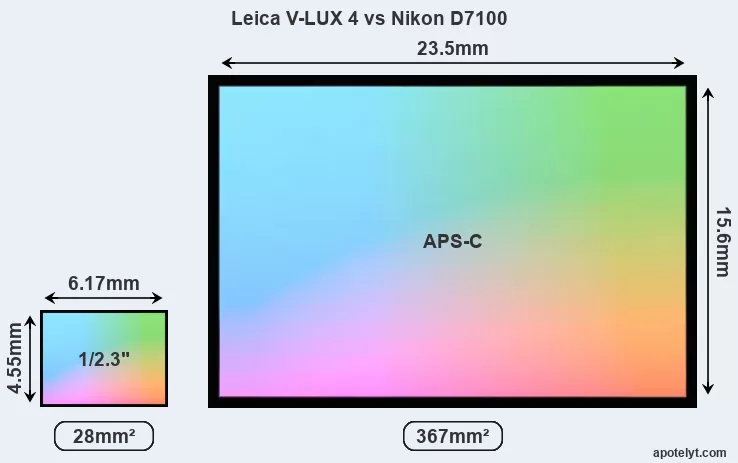
With 24MP, the D7100 offers a higher resolution than the V-LUX 4 (12MP), but the D7100 nevertheless has larger individual pixels (pixel pitch of 3.91μm versus 1.53μm for the V-LUX 4) due to its larger sensor. Moreover, the D7100 is a somewhat more recent model (by 5 months) than the V-LUX 4, and its sensor might have benefitted from technological advances during this time that further enhance the light gathering capacity of its pixel-units. Coming back to sensor resolution, it should be mentioned that neither of the two cameras has an anti-alias filter installed, so they are able to capture all the detail the sensor resolves.
The resolution advantage of the Nikon D7100 implies greater flexibility for cropping images or the possibility to print larger pictures. The maximum print size of the D7100 for good quality output (200 dots per inch) amounts to 30 x 20 inches or 76.2 x 50.8 cm, for very good quality (250 dpi) 24 x 16 inches or 61 x 40.6 cm, and for excellent quality (300 dpi) 20 x 13.3 inches or 50.8 x 33.9 cm. The corresponding values for the Leica V-LUX 4 are 20 x 15 inches or 50.8 x 38.1 cm for good quality, 16 x 12 inches or 40.6 x 30.5 cm for very good quality, and 13.3 x 10 inches or 33.9 x 25.4 cm for excellent quality prints.
The Leica V-LUX 4 has a native sensitivity range from ISO 100 to ISO 3200, which can be extended to ISO 100-6400. The corresponding ISO settings for the Nikon D7100 are ISO 100 to ISO 6400, with the possibility to increase the ISO range to 50-25600.
In terms of underlying technology, the V-LUX 4 is build around a BSI-CMOS sensor, while the D7100 uses a CMOS imager. Both cameras use a Bayer filter for capturing RGB colors on a square grid of photosensors. This arrangement is found in most digital cameras.
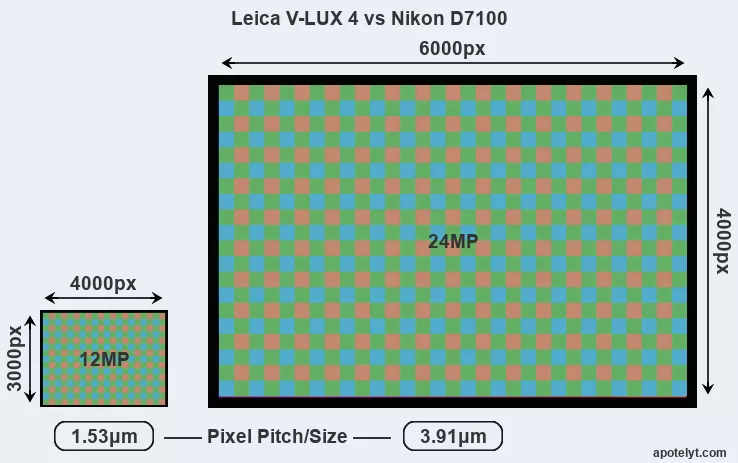
Consistent information on actual sensor performance is available from DXO Mark for many cameras. This service is based on lab testing and assigns an overall score to each camera sensor, as well as ratings for dynamic range ("DXO Landscape"), color depth ("DXO Portrait"), and low-light sensitivity ("DXO Sports"). The adjacent table reports on the physical sensor characteristics and the outcomes of the DXO sensor quality tests for a sample of comparator-cameras.

| Camera Model |
Sensor Class |
Resolution (MP) |
Horiz. Pixels |
Vert. Pixels |
Video Format |
DXO Portrait |
DXO Landscape |
DXO Sports |
DXO Overall |
||
|---|---|---|---|---|---|---|---|---|---|---|---|
| 1. | Leica V-LUX 4 | 1/2.3 | 12.0 | 4000 | 3000 | 1080/60p | 19.8 | 11.1 | 501 | 43 | |
| 2. | Nikon D7100 | APS-C | 24.0 | 6000 | 4000 | 1080/60p | 24.2 | 13.7 | 1256 | 83 | |
| 3. | Canon 70D | APS-C | 20.0 | 5472 | 3648 | 1080/30p | 22.5 | 11.6 | 926 | 68 | |
| 4. | Canon G1 X | 1.5-inch | 14.2 | 4352 | 3264 | 1080/24p | 21.7 | 10.8 | 644 | 60 | |
| 5. | Canon G1 X Mark II | 1.5-inch | 13.0 | 4160 | 3120 | 1080/30p | 21.5 | 10.8 | 581 | 58 | |
| 6. | Canon SX40 | 1/2.3 | 12.0 | 4000 | 3000 | 1080/24p | 19.6 | 10.9 | 409 | 41 | |
| 7. | Canon SX50 | 1/2.3 | 12.0 | 4000 | 3000 | 1080/24p | 20.3 | 11.2 | 179 | 47 | |
| 8. | Leica D-LUX 6 | 1/1.7 | 10.0 | 3648 | 2736 | 1080/60p | 19.8 | 10.8 | -303 | 43 | |
| 9. | Leica V-LUX 2 | 1/2.3 | 14.0 | 4320 | 3240 | 1080/60i | 19.4 | 10.7 | 321 | 39 | |
| 10. | Leica V-LUX 3 | 1/2.3 | 12.0 | 4000 | 3000 | 1080/60p | 19.7 | 11.0 | 430 | 42 | |
| 11. | Leica X Vario | APS-C | 16.1 | 4928 | 3272 | 1080/30p | 23.4 | 12.7 | 1320 | 78 | |
| 12. | Nikon D3300 | APS-C | 24.0 | 6000 | 4000 | 1080/60p | 24.3 | 12.8 | 1385 | 82 | |
| 13. | Nikon D7000 | APS-C | 16.1 | 4928 | 3264 | 1080/24p | 23.5 | 13.9 | 1167 | 80 | |
| 14. | Nikon D7200 | APS-C | 24.0 | 6000 | 4000 | 1080/60p | 24.5 | 14.6 | 1333 | 87 | |
| 15. | Nikon D7500 | APS-C | 20.7 | 5568 | 3712 | 4K/30p | 24.3 | 14.0 | 1483 | 86 | |
| 16. | Panasonic FZ150 | 1/2.3 | 12.0 | 4000 | 3000 | 1080/60p | 19.4 | 10.9 | 132 | 40 | |
| 17. | Panasonic FZ200 | 1/2.3 | 12.0 | 4000 | 3000 | 1080/60p | 19.1 | 10.8 | 114 | 37 | |
| Note: DXO values in italics represent estimates based on sensor size and age. | |||||||||||
Many modern cameras cannot only take still pictures, but also record videos. Both cameras under consideration are equipped with sensors that have a sufficiently high read-out speed for moving images, and both provide the same movie specifications (1080/60p).
Feature comparison
Beyond body and sensor, cameras can and do differ across a range of features. For example, the V-LUX 4 has an electronic viewfinder (1312k dots), while the D7100 has an optical one. Both systems have their advantages, with the electronic viewfinder making it possible to project supplementary shooting information into the framing view, whereas the optical viewfinder offers lag-free viewing and a very clear framing image. The viewfinders of both cameras offer the same field of view (100%), but the viewfinder of the D7100 has a higher magnification than the one of the V-LUX 4 (0.63x vs 0.46x), so that the size of the image transmitted appears closer to the size seen with the naked human eye. The adjacent table lists some of the other core features of the Leica V-LUX 4 and Nikon D7100 along with similar information for a selection of comparators.

| Camera Model |
Viewfinder (Type or 000 dots) |
Control Panel (yes/no) |
LCD Specifications (inch/000 dots) |
LCD Attach- ment |
Touch Screen (yes/no) |
Max Shutter Speed * |
Max Shutter Flaps * |
Built-in Flash (yes/no) |
Built-in Image Stab |
||
|---|---|---|---|---|---|---|---|---|---|---|---|
| 1. | Leica V-LUX 4 | 1312 | n | 3.0 / 460 | swivel | n | 1/4000s | 12.0/s | Y | Y | |
| 2. | Nikon D7100 | optical | Y | 3.2 / 1229 | fixed | n | 1/8000s | 6.0/s | Y | n | |
| 3. | Canon 70D | optical | Y | 3.0 / 1040 | swivel | Y | 1/8000s | 7.0/s | Y | n | |
| 4. | Canon G1 X | optical | n | 3.0 / 922 | swivel | n | 1/4000s | 1.9/s | Y | Y | |
| 5. | Canon G1 X Mark II | optional | n | 3.0 / 1040 | tilting | Y | 1/4000s | 5.2/s | Y | Y | |
| 6. | Canon SX40 | 202 | n | 2.7 / 230 | swivel | n | 1/3200s | 10.3/s | Y | Y | |
| 7. | Canon SX50 | 202 | n | 3.0 / 461 | swivel | n | 1/2000s | 2.2/s | Y | Y | |
| 8. | Leica D-LUX 6 | optional | n | 3.0 / 920 | fixed | n | 1/4000s | 11.0/s | Y | Y | |
| 9. | Leica V-LUX 2 | 202 | n | 3.0 / 460 | swivel | n | 1/2000s | 11.0/s | Y | Y | |
| 10. | Leica V-LUX 3 | 202 | n | 3.0 / 460 | swivel | n | 1/2000s | 12.0/s | Y | Y | |
| 11. | Leica X Vario | optional | n | 3.0 / 920 | fixed | n | 1/2000s | 5.0/s | Y | n | |
| 12. | Nikon D3300 | optical | n | 3.0 / 921 | fixed | n | 1/4000s | 5.0/s | Y | n | |
| 13. | Nikon D7000 | optical | Y | 3.0 / 921 | fixed | n | 1/8000s | 6.0/s | Y | n | |
| 14. | Nikon D7200 | optical | Y | 3.2 / 1229 | fixed | n | 1/8000s | 6.0/s | Y | n | |
| 15. | Nikon D7500 | optical | Y | 3.2 / 922 | tilting | Y | 1/8000s | 8.0/s | Y | n | |
| 16. | Panasonic FZ150 | 202 | n | 3.0 / 460 | swivel | n | 1/2000s | 12.0/s | Y | Y | |
| 17. | Panasonic FZ200 | 1312 | n | 3.0 / 460 | swivel | n | 1/4000s | 12.0/s | Y | Y | |
| Note: *) Information refers to the mechanical shutter, unless the camera only has an electronic one. | |||||||||||
One feature that is present on the D7100, but is missing on the V-LUX 4 is a top-level LCD. While being, of course, smaller than the rear screen, the control panel conveys some of the essential shooting information and can be convenient for quick and easy settings verification.
The V-LUX 4 has an articulated LCD that can be turned to be front-facing. This characteristic will be appreciated by vloggers and photographers who are interested in snapping selfies. In contrast, the D7100 does not have a selfie-screen.The Nikon D7100 has an intervalometer built-in. This enables the photographer to capture time lapse sequences, such as flower blooming, a sunset or moon rise, without purchasing an external camera trigger and related software.
Concerning the storage of imaging data, both the V-LUX 4 and the D7100 write their files to SDXC cards. The D7100 features dual card slots, which can be very useful in case a memory card fails. In contrast, the V-LUX 4 only has one slot. Both cameras can use UHS-I cards, which provide for Ultra High Speed data transfer of up to 104 MB/s.
Connectivity comparison
For some imaging applications, the extent to which a camera can communicate with its environment can be an important aspect in the camera decision process. The table below provides an overview of the connectivity of the Leica V-LUX 4 and Nikon D7100 and, in particular, the interfaces the cameras (and selected comparators) provide for accessory control and data transfer.

| Camera Model |
Hotshoe Port |
Internal Mic / Speaker |
Microphone Port |
Headphone Port |
HDMI Port |
USB Port |
WiFi Support |
NFC Support |
Bluetooth Support |
||
|---|---|---|---|---|---|---|---|---|---|---|---|
| 1. | Leica V-LUX 4 | Y | stereo / mono | Y | - | mini | 2.0 | - | - | - | |
| 2. | Nikon D7100 | Y | stereo / mono | Y | Y | mini | 2.0 | - | - | - | |
| 3. | Canon 70D | Y | stereo / mono | Y | - | mini | 2.0 | Y | - | - | |
| 4. | Canon G1 X | Y | stereo / mono | - | - | mini | 2.0 | - | - | - | |
| 5. | Canon G1 X Mark II | Y | stereo / mono | - | - | mini | 2.0 | Y | Y | - | |
| 6. | Canon SX40 | Y | stereo / mono | - | - | YES | 2.0 | - | - | - | |
| 7. | Canon SX50 | Y | stereo / mono | - | - | mini | 2.0 | - | - | - | |
| 8. | Leica D-LUX 6 | Y | stereo / mono | - | - | mini | 2.0 | - | - | - | |
| 9. | Leica V-LUX 2 | Y | stereo / mono | - | - | mini | 2.0 | - | - | - | |
| 10. | Leica V-LUX 3 | Y | stereo / - | - | - | mini | 2.0 | - | - | - | |
| 11. | Leica X Vario | Y | stereo / mono | - | - | mini | 2.0 | - | - | - | |
| 12. | Nikon D3300 | Y | mono / mono | Y | - | mini | 2.0 | - | - | - | |
| 13. | Nikon D7000 | Y | mono / mono | Y | - | mini | 2.0 | - | - | - | |
| 14. | Nikon D7200 | Y | stereo / mono | Y | Y | mini | 2.0 | Y | Y | - | |
| 15. | Nikon D7500 | Y | stereo / mono | Y | Y | mini | 2.0 | Y | - | Y | |
| 16. | Panasonic FZ150 | Y | stereo / - | - | - | mini | 2.0 | - | - | - | |
| 17. | Panasonic FZ200 | Y | stereo / mono | Y | - | mini | 2.0 | - | - | - |
Both the V-LUX 4 and the D7100 have been discontinued, but can regularly be found used on ebay. The V-LUX 4 was replaced by the Leica V-LUX Typ 114, while the D7100 was followed by the Nikon D7200. Further information on the features and operation of the V-LUX 4 and D7100 can be found, respectively, in the Leica V-LUX 4 Manual (free pdf) or the online Nikon D7100 Manual.
Review summary
So how do things add up? Is there a clear favorite between the Leica V-LUX 4 and the Nikon D7100? Which camera is better? The listing below highlights the relative strengths of the two models.

Arguments in favor of the Leica V-LUX 4:
- More framing info: Has an electronic viewfinder that displays shooting data.
- More flexible LCD: Has a swivel screen for odd-angle shots in portrait or landscape orientation.
- More selfie-friendly: Has an articulated screen that can be turned to be front-facing.
- Faster burst: Shoots at higher frequency (12 vs 6 flaps/sec) to capture the decisive moment.
- Ready to shoot: Comes with a built-in lens, while the D7100 requires a separate lens.
- More compact: Is smaller (125x87mm vs 136x107mm) and thus needs less room in the bag.
- Less heavy: Is lighter even though it comes with a built-in lens (unlike the D7100).
- Sharper images: Has hand-shake reducing image stabilization built-in.
- More prestigious: Has the Leica luxury appeal, which ensures a high resale price.
- More affordable: Was introduced at a lower price, despite coming with a built-in lens.
- More heavily discounted: Has been on the market for longer (launched in September 2012).

Advantages of the Nikon D7100:
- More detail: Has more megapixels (24 vs 12MP), which boosts linear resolution by 44%.
- Better image quality: Features bigger pixels on a larger sensor for higher quality imaging.
- Richer colors: The pixel size advantage translates into images with better, more accurate colors.
- More dynamic range: Larger pixels capture a wider spectrum of light and dark details.
- Better low-light sensitivity: Larger pixels means good image quality even under poor lighting.
- Better sound control: Has a headphone port that enables audio monitoring while recording.
- Brighter framing: Features an optical viewfinder for clear, lag-free composition.
- Larger viewfinder image: Features a viewfinder with a higher magnification (0.63x vs 0.46x).
- Easier setting verification: Features a control panel on top to check shooting parameters.
- Larger screen: Has a bigger rear LCD (3.2" vs 3.0") for image review and settings control.
- More detailed LCD: Has a higher resolution rear screen (1229k vs 460k dots).
- Faster shutter: Has higher mechanical shutter speed (1/8000s vs 1/4000s) to freeze action.
- Easier time-lapse photography: Has an intervalometer built-in for low frequency shooting.
- More flexible: Makes it possible to change lenses and thus to use specialty optics.
- Longer lasting: Gets more shots (950 versus 540) out of a single battery charge.
- Better sealing: Is splash and dust sealed for shooting in inclement weather conditions.
- Greater peace of mind: Features a second card slot as a backup in case of memory card failure.
- More modern: Was introduced somewhat (5 months) more recently.
If the number of relative strengths (bullet points above) is taken as a guide, the D7100 is the clear winner of the contest (18 : 11 points). However, the relative importance of the various individual camera aspects will vary according to personal preferences and needs, so that you might like to apply corresponding weights to the particular features before making a decision on a new camera. A professional wedding photographer will view the differences between cameras in a way that diverges from the perspective of a travel photog, and a person interested in cityscapes has distinct needs from a macro shooter. Hence, the decision which camera is best and worth buying is often a very personal one.
How about other alternatives? Do the specifications of the Leica V-LUX 4 and the Nikon D7100 place the cameras among the top in their class? Find out in the latest Best Superzoom Camera and Best DSLR Camera listings whether the two cameras rank among the cream of the crop.
In any case, while the comparison of technical specifications can provide a useful overview of the capabilities of different cameras, it remains partial and cannot reveal, for example, the shooting experience and imaging performance when actually working with the V-LUX 4 or the D7100. At times, user reviews, such as those published at amazon, address these issues in a useful manner, but such feedback is on many occasions incomplete, inconsistent, and unreliable.
Expert reviews
This is why hands-on reviews by experts are important. The adjacent summary-table relays the overall verdicts of several of the most popular camera review sites (amateurphotographer [AP], cameralabs [CL], digitalcameraworld [DCW], dpreview [DPR], ephotozine [EPZ], photographyblog [PB]). As can be seen, the professional reviewers agree in many cases on the quality of different cameras, but sometimes their assessments diverge, reinforcing the earlier point that a camera decision is often a very personal choice.

| Camera Model |
AP score |
CL score |
DCW score |
DPR score |
EPZ score |
PB score |
Camera Launch |
Launch Price (USD) |
Street Price |
||
|---|---|---|---|---|---|---|---|---|---|---|---|
| 1. | Leica V-LUX 4 | .. | .. | .. | .. | .. | .. | Sep 2012 | 949 | ebay.com | |
| 2. | Nikon D7100 | 5/5 | + + | .. | 85/100 | 4.5/5 | 4.5/5 | Feb 2013 | 1,199 | ebay.com | |
| 3. | Canon 70D | 5/5 | + + | .. | 83/100 | 4.5/5 | 5/5 | Jul 2013 | 1,199 | ebay.com | |
| 4. | Canon G1 X | 5/5 | + | .. | 76/100 | 4/5 | 4.5/5 | Jan 2012 | 799 | ebay.com | |
| 5. | Canon G1 X Mark II | 3/5 | + | .. | 77/100 | 4/5 | 4.5/5 | Feb 2014 | 799 | ebay.com | |
| 6. | Canon SX40 | .. | + | .. | .. | 4.5/5 | 4/5 | Sep 2011 | 429 | ebay.com | |
| 7. | Canon SX50 | 3/5 | + + | .. | 72/100 | 4.5/5 | 4.5/5 | Sep 2012 | 429 | ebay.com | |
| 8. | Leica D-LUX 6 | .. | .. | .. | .. | 4/5 | 4/5 | Sep 2012 | 699 | ebay.com | |
| 9. | Leica V-LUX 2 | .. | .. | .. | .. | .. | .. | Sep 2010 | 849 | ebay.com | |
| 10. | Leica V-LUX 3 | .. | .. | .. | .. | .. | .. | Dec 2011 | 949 | ebay.com | |
| 11. | Leica X Vario | 3/5 | .. | .. | .. | 4/5 | 4/5 | Jun 2013 | 2,850 | ebay.com | |
| 12. | Nikon D3300 | 3/5 | + | .. | 77/100 | 4.5/5 | 4.5/5 | Jan 2014 | 499 | ebay.com | |
| 13. | Nikon D7000 | 4/5 | .. | .. | 80/100 | 4.5/5 | 4.5/5 | Sep 2010 | 1,499 | ebay.com | |
| 14. | Nikon D7200 | 4/5 | + + | .. | 84/100 | 4.5/5 | 4.5/5 | Mar 2015 | 1,199 | ebay.com | |
| 15. | Nikon D7500 | 4.5/5 | + + | 4.5/5 | 86/100 | 5/5 | 4.5/5 | Apr 2017 | 1,299 | amazon.com | |
| 16. | Panasonic FZ150 | 3/5 | + + | .. | 76/100 | 4/5 | 4.5/5 | Aug 2011 | 499 | ebay.com | |
| 17. | Panasonic FZ200 | 3/5 | + + | .. | 80/100 | 4.5/5 | 4.5/5 | Jul 2012 | 599 | ebay.com | |
| Note: (+ +) highly recommended; (+) recommended; (o) reviewed; (..) not available. | |||||||||||
The review scores listed above should be treated with care, though. The ratings are only valid when referring to cameras in the same category and of the same age. Hence, a score should always be seen in the context of the camera's market launch date and its price, and comparisons of ratings among very different cameras or across long time periods have little meaning. Also, kindly note that some of the listed sites have over time developped their review approaches and their reporting style.

Check V-LUX 4 offers at
ebay.com

Check D7100 offers at
ebay.com
Other camera comparisons
Did this review help to inform your camera decision process? In case you would like to check on the differences and similarities of other camera models, just use the search menu below. Alternatively, you can follow any of the listed hyperlinks for comparisons that others found interesting.
- Canon 1D X Mark II vs Nikon D7100
- Canon 6D Mark II vs Nikon D7100
- Canon SX530 vs Leica V-LUX 4
- Canon T1i vs Nikon D7100
- Fujifilm GFX 50R vs Nikon D7100
- Leica TL vs Leica V-LUX 4
- Leica V-LUX 4 vs Olympus E-P1
- Leica V-LUX 4 vs Panasonic GH1
- Leica V-LUX 4 vs Samsung NX30
- Leica V-LUX 4 vs Sony WX800
- Nikon D7100 vs Olympus E-P2
- Nikon D7100 vs Olympus E-PL2
Specifications: Leica V-LUX 4 vs Nikon D7100
Below is a side-by-side comparison of the specs of the two cameras to facilitate a quick review of their differences and common features.
| Camera Model | Leica V-LUX 4 | Nikon D7100 |
|---|---|---|
| Camera Type | Fixed lens compact camera | Digital single lens reflex |
| Camera Lens | 25-600mm f/2.8 | Nikon F mount lenses |
| Launch Date | September 2012 | February 2013 |
| Launch Price | USD 949 | USD 1,199 |
| Sensor Specs | Leica V-LUX 4 | Nikon D7100 |
| Sensor Technology | BSI-CMOS | CMOS |
| Sensor Format | 1/2.3" Sensor | APS-C Sensor |
| Sensor Size | 6.17 x 4.55 mm | 23.5 x 15.6 mm |
| Sensor Area | 28.0735 mm2 | 366.6 mm2 |
| Sensor Diagonal | 7.7 mm | 28.2 mm |
| Crop Factor | 5.6x | 1.5x |
| Sensor Resolution | 12 Megapixels | 24 Megapixels |
| Image Resolution | 4000 x 3000 pixels | 6000 x 4000 pixels |
| Pixel Pitch | 1.53 μm | 3.91 μm |
| Pixel Density | 42.74 MP/cm2 | 6.55 MP/cm2 |
| Moiré control | no AA filter | no AA filter |
| Movie Capability | 1080/60p Video | 1080/60p Video |
| ISO Setting | 100 - 3,200 ISO | 100 - 6,400 ISO |
| ISO Boost | 100 - 6,400 ISO | 50 - 25,600 ISO |
| DXO Sensor Quality (score) | .. | 83 |
| DXO Color Depth (bits) | .. | 24.2 |
| DXO Dynamic Range (EV) | .. | 13.7 |
| DXO Low Light (ISO) | .. | 1256 |
| Screen Specs | Leica V-LUX 4 | Nikon D7100 |
| Viewfinder Type | Electronic viewfinder | Optical viewfinder |
| Viewfinder Field of View | 100% | 100% |
| Viewfinder Magnification | 0.46x | 0.63x |
| Viewfinder Resolution | 1312k dots | |
| Top-Level Screen | no Top Display | Control Panel |
| LCD Framing | Live View | Live View |
| Rear LCD Size | 3.0inch | 3.2inch |
| LCD Resolution | 460k dots | 1229k dots |
| LCD Attachment | Swivel screen | Fixed screen |
| Shooting Specs | Leica V-LUX 4 | Nikon D7100 |
| Focus System | Contrast-detect AF | Phase-detect AF |
| Continuous Shooting | 12 shutter flaps/s | 6 shutter flaps/s |
| Time-Lapse Photography | no Intervalometer | Intervalometer built-in |
| Fill Flash | Built-in Flash | Built-in Flash |
| Storage Medium | SDXC cards | SDXC cards |
| Single or Dual Card Slots | Single card slot | Dual card slots |
| UHS card support | UHS-I | UHS-I |
| Connectivity Specs | Leica V-LUX 4 | Nikon D7100 |
| External Flash | Hotshoe | Hotshoe |
| USB Connector | USB 2.0 | USB 2.0 |
| HDMI Port | mini HDMI | mini HDMI |
| Microphone Port | External MIC port | External MIC port |
| Headphone Socket | no Headphone port | Headphone port |
| Wifi Support | no Wifi | no Wifi |
| Body Specs | Leica V-LUX 4 | Nikon D7100 |
| Environmental Sealing | not weather sealed | Weathersealed body |
| Battery Type | Leica BP-DC12 | Nikon EN-EL15 |
| Battery Life (CIPA) | 540 shots per charge | 950 shots per charge |
| Body Dimensions |
125 x 87 x 110 mm (4.9 x 3.4 x 4.3 in) |
136 x 107 x 76 mm (5.4 x 4.2 x 3.0 in) |
| Camera Weight | 588 g (20.7 oz) | 765 g (27.0 oz) |

Check V-LUX 4 offers at
ebay.com

Check D7100 offers at
ebay.com
Did you notice an error on this page? If so, please get in touch, so that we can correct the information.

